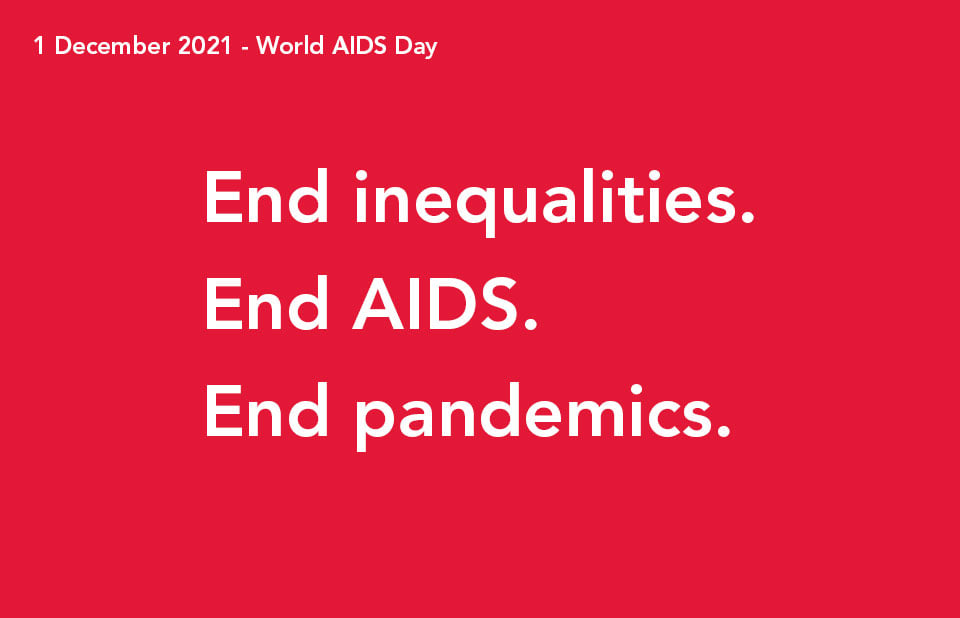
World AIDS Day 2021: End inequalities. End AIDS. End pandemics.
This World AIDS Day, the Region will be highlighting the urgent need to end the inequalities that drive AIDS and other pandemics around the world.
Without bold action against inequalities, the world risks a resurgence of HIV, as well as a prolonged COVID-19 pandemic and a spiralling social and economic crisis.
Forty years since the first AIDS cases were reported, HIV still threatens the world. Today, the world is off track from delivering on the shared commitment to end AIDS by 2030 and is even risking a resurgence, not because of a lack of knowledge or tools to beat AIDS, but because of structural inequalities that obstruct proven solutions to HIV prevention and treatment.
Economic, social, cultural and legal inequalities must be ended as a matter of urgency if we are to end AIDS by 2030.
Although there is a perception that a time of crisis is not the right time to prioritize tackling the underlying social injustices, it is clear that without doing so, the crisis cannot be overcome.
Tackling inequalities is a long-standing global promise, the urgency of which has only increased. In 2015, all countries pledged to reduce inequalities within and between countries as part of the Sustainable Development Goals. The Global AIDS Strategy 2021–2026: End Inequalities, End AIDS and the Political Declaration on AIDS adopted at the 2021 United Nations High-Level Meeting on AIDS have ending inequalities at their core.
As well as being central to ending AIDS, tackling inequalities will advance the human rights of key populations and people who are living with HIV, make societies better prepared to beat COVID-19 and other pandemics and support economic recovery and stability. Fulfilling the promise to tackle inequalities will save millions of lives and will benefit society as a whole.
But ending inequalities requires transformative change. Political, economic and social policies need to protect the rights of everyone and pay attention to the needs of disadvantaged and marginalized communities.
We know how to beat AIDS, we know what the inequalities obstructing progress are, and we know how to tackle them. The policies to address inequalities can be implemented, but they require leaders to be bold.
Governments must now move from commitment to action. Governments must promote inclusive social and economic growth. They must eliminate discriminatory laws, policies and practices to ensure equal opportunity and reduce inequalities. It is time for governments to keep their promises. They must act now, and we must make them accountable.
This World AIDS Day, let’s remind our governments that global inequalities affect us all, no matter who we are or where we are located. This World AIDS Day, let’s demand action to end inequalities and AIDS and all other pandemics that thrive on inequalities.
WHAT IS PANCAP?
PANCAP is a Caribbean regional partnership of governments, regional civil society organisations, regional institutions and organisations, bilateral and multilateral agencies and contributing donor partners established on 14 February 2001. PANCAP provides a structured and unified approach to the Caribbean’s response to the HIV epidemic, and coordinates the response through the Caribbean Regional Strategic Framework on HIV and AIDS to maximise efficient use of resources and increase impact, mobilise resources and build the capacity of partners.
What are the Global AIDS Strategy 2021–2026 targets and commitments?
If targets and commitments in the strategy are achieved:
- The number of people who newly acquire HIV will decrease from 1.7 million in 2019 to less than 370 000 by 2025
- The number of people dying from AIDS-related illnesses will decrease from 690 000 in 2019 to less than 250 000 in 2025.
- The goal of eliminating new HIV infections among children will see the number of new HIV infections drop from 150,000 in 2019 to less than 22,000 in 2025.
What are the 95-95-95 Targets for ending AIDS?
- 95% of People Living with HIV know their HIV status;
- 95% of people who know their status on treatment; and
- 95% of people on treatment with suppressed viral loads.
HELPFUL LINKS:
Global AIDS Strategy 2021–2026, End Inequalities, End AIDS
https://pancap.org/pancap-documents/global-aids-strategy-2021-2026-end-inequalities-end-aids/
Caribbean Regional Strategic Framework on HIV and AIDS (CRSF) 2019-2025
https://pancap.org/pancap-documents/caribbean-regional-strategic-framework-2019-2025/
